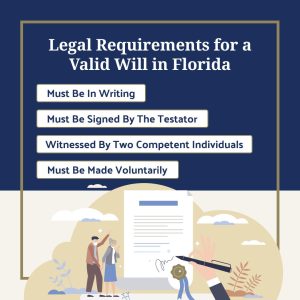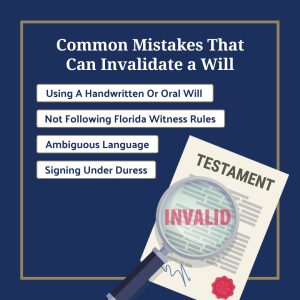Creating a will is one of the most important steps you can take to protect your loved ones and ensure your wishes are honored after you’re gone. But in Florida, simply writing down what you want isn’t enough. To be legally valid, a will must meet specific requirements under state law. In this guide, we’ll walk you through what makes a will legally enforceable in Florida, common mistakes to avoid, and how to make sure your estate plan truly holds up when it matters most.
What Is a Will?
A will is a legal document that outlines how you want your assets to be distributed after your death. It can also name guardians for minor children and appoint someone to carry out your wishes, called a personal representative or executor. Think of it as your voice after you’re gone. A properly drafted document will ensure that your estate is handled the way you intend, not how the court decides.
Legal Requirements for a Valid Will in Florida
In Florida, not just any written document counts as a valid will. The state has strict rules about how a will must be created, signed, and witnessed. Failing to meet these standards can render your will invalid and leave your estate subject to intestate laws (meaning the state decides who gets what). Here’s what you need to know to make sure your will holds up in court.
Must Be in Writing
Florida law requires that a will be in writing; it can’t be spoken or recorded verbally. Typed and printed wills are the standard. While handwritten wills (also called holographic wills) are recognized in some states, Florida does not honor them unless they meet the exact formal requirements as typed wills.
Must Be Signed by the Testator
The person creating the will, known as the testator, must sign the document at the end. This signature shows that you approve of the contents and intend it to be your final will. If you’re physically unable to sign, someone else can sign on your behalf, but only at your direction and in your presence.
Must Be Witnessed by Two Competent Individuals
Florida law requires that two witnesses be present when the testator signs the will. These witnesses must be competent adults, and they must sign the will in the presence of the testator and each other. While witnesses can be beneficiaries, it’s best to use neutral parties to avoid potential conflicts or legal challenges later on.
Testator Must Have Testamentary Capacity
To create a valid will, you must have the mental capacity to understand what you’re doing. This means knowing the nature of your assets, who your beneficiaries are, and what the will is intended to do. If someone later claims you lacked capacity, perhaps due to dementia or illness, the will could be contested.
Must Be Made Voluntarily and Without Undue Influence
Your will must be made of your own free will. If someone pressures, manipulates, or coerces you into changing your estate plan, it might be considered undue influence. Courts regard this issue seriously. That’s why it’s crucial to work with an attorney and keep thorough records, especially if you’re disinheriting someone or making unusual changes.
What Is a Self-Proving Affidavit?
A self-proving affidavit is an optional but highly recommended addition to your will in Florida. It’s a notarized statement signed by you and your witnesses at the time the will is executed. This affidavit confirms that the will was properly signed and witnessed according to Florida law.
Why does it matter? Because without it, your witnesses may need to testify in probate court to validate the will. That can cause delays, especially if they’ve moved away or passed on. Including a self-proving affidavit speeds up the probate process and gives your family one less thing to worry about during an already stressful time.
Common Mistakes That Can Invalidate a Will
Even with the best intentions, it’s surprisingly easy to make mistakes that could render a will invalid in Florida. A simple oversight, like using the wrong type of witness or vague wording, can lead to probate delays, legal challenges, or even your wishes being ignored. Below are some of the most common pitfalls to avoid when creating or updating your will.
 Using a Handwritten or Oral Will
Using a Handwritten or Oral Will
In Florida, handwritten wills (also called holographic wills) and oral wills (spoken wishes) are not legally recognized, even if they’re signed or recorded. A valid will must follow Florida’s strict formalities, including being typed, properly witnessed, and signed by the testator. Relying on informal notes or verbal instructions can create confusion and won’t hold up in court.
Not Following Florida Witness Rules
A will must be signed in the presence of two competent adult witnesses, and those witnesses must also sign the will in each other’s presence. If any of these steps are missed, the will may be considered invalid. Using disinterested witnesses (people who aren’t named in your will) can also help avoid potential challenges from other heirs.
Ambiguous Language or Unclear Instructions
Your will should leave no room for interpretation. Vague phrases like “split everything evenly” or “give to my children” can cause disputes, especially in blended families or when asset values change. A well-drafted will uses clear, specific language to explain who gets what, how, and when. The more precise your instructions are, the fewer headaches your beneficiaries will have.
Signing Under Duress or Without Capacity
If it’s believed you were coerced, pressured, or mentally unfit when signing your will, the document can be challenged in court. This is especially common among elderly individuals or those with cognitive decline. To prevent this, make sure your will is signed in a calm, professional setting, ideally with legal oversight and witnesses who can later verify your intent and state of mind.
Using DIY Forms Without Legal Review
Online templates and fill-in-the-blank will kits may seem convenient, but they often lack the legal precision required under Florida law. A small error, like improper wording or missing signatures, can make the whole document unenforceable. Working with an Orlando estate planning attorney ensures your will meets all legal standards and truly protects your wishes.
Updating or Revoking a Will in Florida
Your will isn’t a “set it and forget it” document. Life changes, and your estate plan should change with it. Whether you’re welcoming a new child, going through a divorce, or simply changing your mind about who should inherit what, Florida law gives you several ways to update or revoke your will. However, it must be done correctly to avoid confusion or legal challenges.
When to Update Your Will
You should review your will every few years or after any major life event. This includes getting married or divorced, having children or grandchildren, losing a loved one, moving to Florida, or acquiring significant new assets. Keeping your will current ensures it reflects your true intentions and prevents outdated information from causing complications during probate.
How to Properly Amend or Revoke a Will
If you only need to make small changes, like updating a name or changing an executor, you can use a legal document called a codicil. For significant changes, it’s often best to revoke the old will and create a new one entirely. In Florida, revocation must be done clearly, either in writing or by physically destroying the old document with the intent to revoke it.
Dangers of Unintended Revocation or Multiple Versions
Having multiple versions of a will, or unclear attempts to revoke a prior one, can create chaos. Courts may question which version is valid, leading to disputes among heirs. Even small errors, like forgetting to destroy old copies or referencing an outdated will, can trigger confusion. To avoid this, always work with an attorney when making updates and clearly date and label each version.
Special Considerations for Out-of-State Wills
If you’ve recently moved to Florida and already have a will drafted in another state, it’s important to review it with a local estate planning attorney. While many wills remain valid across state lines, Florida has some unique laws, especially regarding homestead property and spousal rights, that may affect how your will is interpreted and enforced. A simple review can prevent major headaches later on.
Is an Out-of-State Will Valid in Florida?
Generally, Florida will honor a will created in another state as long as it was valid under that state’s laws. However, that doesn’t mean it’s a perfect fit. Differences in witnessing requirements, language, or legal procedures may still cause confusion or delays in probate. To ensure a smooth process, it’s wise to have your will reviewed by a Florida-based attorney.
When to Re-Draft After Moving to Florida
If you’ve changed your state of residence, it’s a good time to revisit your estate plan. You may need to re-draft your will to comply with Florida’s formalities or update it to reflect changes in property ownership, tax laws, or family dynamics. It’s also a chance to address new priorities and avoid unintended conflicts.
Homestead Property and Florida-Specific Clauses
Florida has strict homestead laws that affect how your primary residence can be passed down, especially if you’re married or have minor children. Your out-of-state will may not account for these rules, potentially leading to invalid provisions or unintended restrictions. Including Florida-specific clauses and aligning your will with state law is essential to properly protect your home and heirs.
What Happens If a Will Is Found Invalid in Florida?
If a will doesn’t meet Florida’s legal requirements or is successfully contested in court, it may be declared invalid. When that happens, the court won’t follow the instructions in the will. Instead, the estate will be handled as if no will existed at all. This can lead to unintended consequences, family stress, and unnecessary expenses.
Florida’s Intestacy Laws Take Over
When there’s no valid will, Florida’s intestate succession laws determine who inherits your property. This legal formula prioritizes spouses, children, and other close relatives, but it may not reflect your true wishes. For example, unmarried partners, friends, or stepchildren you intended to include may be completely excluded.
Family Disputes and Court Challenges
An invalid or unclear will often leads to disagreements among surviving family members. Disputes over who should inherit, manage the estate, or handle funeral arrangements can quickly turn into legal battles. These conflicts can damage relationships and drain estate resources through prolonged litigation.
Delays and Costs in Probate Administration
Without a valid will to guide the probate process, settling your estate typically takes longer and costs more. The court may need to appoint a personal representative, track down heirs, and resolve disputes, all of which add time and legal fees. What could have been a smooth transition becomes a drawn-out, stressful ordeal for your loved ones.
Schedule a Consultation With an Estate Planning Attorney
Making sure your will is legally valid in Florida isn’t just about checking boxes; it’s about protecting your family, honoring your wishes, and giving yourself peace of mind. Whether you’re creating a will for the first time or updating an existing one, working with an experienced attorney makes all the difference. Our knowledgeable Orlando estate planning attorneys are here to guide you through every step. Contact us today to learn more about the personalized estate planning services offered by our attorneys, and feel confident knowing your legacy is in good hands.


 Using a Handwritten or Oral Will
Using a Handwritten or Oral Will